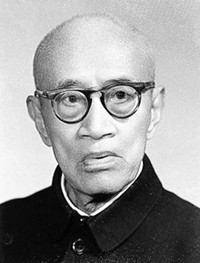1) Liang Shuming s Outlook on Life


梁漱溟的生命观
2) The Views on Political Power of Liang Shuming


梁漱溟的政权观
3) Liang Shu-ming


梁漱溟
1.
An Insight into the Problem of Countryside and Agriculture and Peasantry Given by LIANG Shu-ming’s Theory of Rural Construction;
从梁漱溟乡村建设理论看“三农”问题
2.
Between Tradition and Modernity: Liang Shu-ming s Approach to the Constitutional Government;
在传统与现代之间:梁漱溟的宪政之道
3.
Confucianism s Socialization and Socialized Confucianism——Brief on Cultural Philosophy of Liang Shu-ming;
儒学的社会化与社会化的儒学——梁漱溟文化哲学简论
4) Liang Shuming


梁漱溟
1.
How Liang Shuming Faced His Setback in Life;


梁漱溟如何面对自己人生的挫折
2.
Life.Will. ArtSlightly Discussing the Life Esthetics Thought of Liang Shuming;


生命·意欲·艺术——梁漱溟生命美学思想论略
3.
Ethic Implication and Practice Path of Liang Shuming s Rural Construction Theory;


梁漱溟乡村建设理论的伦理蕴涵与实践路向
5) Liang Shu-min


梁漱溟
1.
Analysis on Liang Shu-min s Explanation Methods of Confucius;


试析梁漱溟解释孔子的方法
2.
Liang Shu-min is the leader of Countryside Construction Movement in the first half of the 20th century.
梁漱溟是20世纪上半叶乡村建设运动的领袖,他提出乡村建设思想有其特定的社会历史条件以及文化背景。
6) Liang Suming


梁漱溟
1.
Liang Suming and Hu Shi on Chinese and western cultures;


梁漱溟和胡适对中西文化态度比较
2.
Liang Suming s basic views on constitution and constitutionalism, especially his analysis on China s puzzledom in imitating and transplanting the Western constitutionalism and his thoughtfulness about the way for China to move toward constitutionalism.
本文述介梁漱溟先生关于宪法与宪政的基本看法 ,特别是他从不同人文类型的观照中对于中国模仿、移植西方宪政的困境的分析 ,有关中国走向宪政之路的思虑 ,同时并述及各种政治力量对此所作的反应 ,指出在中国近代百年宪政思潮中 ,梁漱溟宪政思想的特立卓越处。
3.
On the basis of the Chinese traditional philosophy and by adopting the metaphysical approach,Liang Suming studies human mind through life.
梁漱溟在中国传统哲学的基础上 ,以形而上学的方法 ,由人生探求人心 ,涉及心理学的学科性质、心理的实质及人类心理的基本特征等心理学的基础理论问题。
补充资料:梁漱溟
| 梁漱溟(1893~1988) 中国思想家。原籍广西桂林。毕业于直隶法政专门学校。辛亥革命后潜心于佛学。1917年被聘为北京大学哲学系讲师,主讲印度哲学,1922年发表《东西文化及其哲学》,提出东西文化比较观。1924年辞去北京大学教职,先后到山东、河南从事“乡村建设”,自办教育。后在山东邹县创办乡村建设研究院,主编《村治月刊》。30年代初发表《中国民族自救运动之最后觉悟》和《乡村建设理论》,主张以“乡村建设”取代中国共产党领导的中国革命。抗战时期参加民主党团同盟。1946年曾随参观团赴延安参观、考察。中华人民共和国建立后任历届全国政协委员。
梁漱溟在哲学上吸收了柏格森的“生命哲学”观点,融合孔子、孟子和王守仁的哲学 ,在本体论方面认为只有与“已成的我”相对立的“现在的我”(心、精神)才是真实的存在;在认识论方面提倡直觉主义,宣传人我一体,物我一体的神秘境界。他根据“意欲所向”为标准,把人类文化分为中国、西方、印度3种类型,认为“中国文化是以意欲自为调和、持中为其根本精神的”。他反对用阶级的观点分析中国社会,认为中国社会是“职业分途”、“伦理本位”的社会,不存在阶级的界限。著有《中国文化要义》、《印度哲学概论》、《朝话》、《漱溟卅前文录》、《漱溟卅后文录》等。 |
说明:补充资料仅用于学习参考,请勿用于其它任何用途。
参考词条
